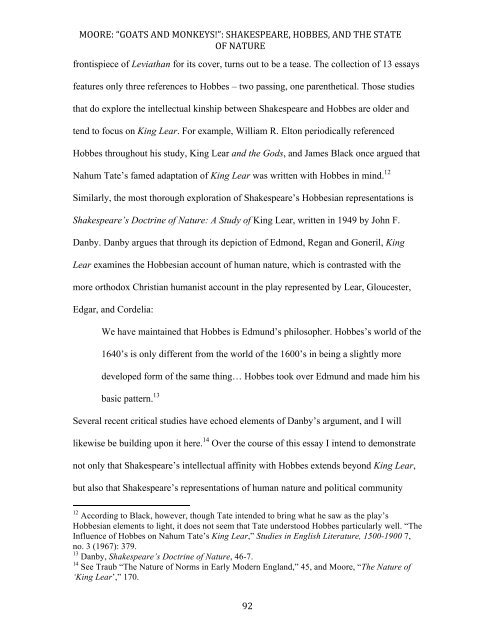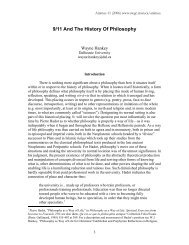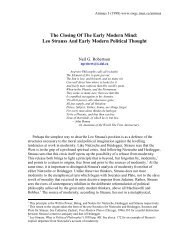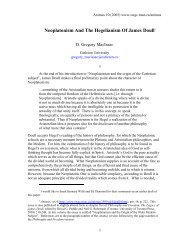âgoats and monkeys!â: shakespeare, hobbes, and the state of nature
âgoats and monkeys!â: shakespeare, hobbes, and the state of nature
âgoats and monkeys!â: shakespeare, hobbes, and the state of nature
You also want an ePaper? Increase the reach of your titles
YUMPU automatically turns print PDFs into web optimized ePapers that Google loves.
MOORE: “GOATS AND MONKEYS!”: SHAKESPEARE, HOBBES, AND THE STATE <br />
OF NATURE <br />
frontispiece <strong>of</strong> Leviathan for its cover, turns out to be a tease. The collection <strong>of</strong> 13 essays<br />
features only three references to Hobbes – two passing, one paren<strong>the</strong>tical. Those studies<br />
that do explore <strong>the</strong> intellectual kinship between Shakespeare <strong>and</strong> Hobbes are older <strong>and</strong><br />
tend to focus on King Lear. For example, William R. Elton periodically referenced<br />
Hobbes throughout his study, King Lear <strong>and</strong> <strong>the</strong> Gods, <strong>and</strong> James Black once argued that<br />
Nahum Tate’s famed adaptation <strong>of</strong> King Lear was written with Hobbes in mind. 12<br />
Similarly, <strong>the</strong> most thorough exploration <strong>of</strong> Shakespeare’s Hobbesian representations is<br />
Shakespeare’s Doctrine <strong>of</strong> Nature: A Study <strong>of</strong> King Lear, written in 1949 by John F.<br />
Danby. Danby argues that through its depiction <strong>of</strong> Edmond, Regan <strong>and</strong> Goneril, King<br />
Lear examines <strong>the</strong> Hobbesian account <strong>of</strong> human <strong>nature</strong>, which is contrasted with <strong>the</strong><br />
more orthodox Christian humanist account in <strong>the</strong> play represented by Lear, Gloucester,<br />
Edgar, <strong>and</strong> Cordelia:<br />
We have maintained that Hobbes is Edmund’s philosopher. Hobbes’s world <strong>of</strong> <strong>the</strong><br />
1640’s is only different from <strong>the</strong> world <strong>of</strong> <strong>the</strong> 1600’s in being a slightly more<br />
developed form <strong>of</strong> <strong>the</strong> same thing… Hobbes took over Edmund <strong>and</strong> made him his<br />
basic pattern. 13<br />
Several recent critical studies have echoed elements <strong>of</strong> Danby’s argument, <strong>and</strong> I will<br />
likewise be building upon it here. 14 Over <strong>the</strong> course <strong>of</strong> this essay I intend to demonstrate<br />
not only that Shakespeare’s intellectual affinity with Hobbes extends beyond King Lear,<br />
but also that Shakespeare’s representations <strong>of</strong> human <strong>nature</strong> <strong>and</strong> political community<br />
12 According to Black, however, though Tate intended to bring what he saw as <strong>the</strong> play’s<br />
Hobbesian elements to light, it does not seem that Tate understood Hobbes particularly well. “The<br />
Influence <strong>of</strong> Hobbes on Nahum Tate’s King Lear,” Studies in English Literature, 1500-1900 7,<br />
no. 3 (1967): 379.<br />
13 Danby, Shakespeare’s Doctrine <strong>of</strong> Nature, 46-7.<br />
14 See Traub “The Nature <strong>of</strong> Norms in Early Modern Engl<strong>and</strong>,” 45, <strong>and</strong> Moore, “The Nature <strong>of</strong><br />
‘King Lear’,” 170.<br />
92
















